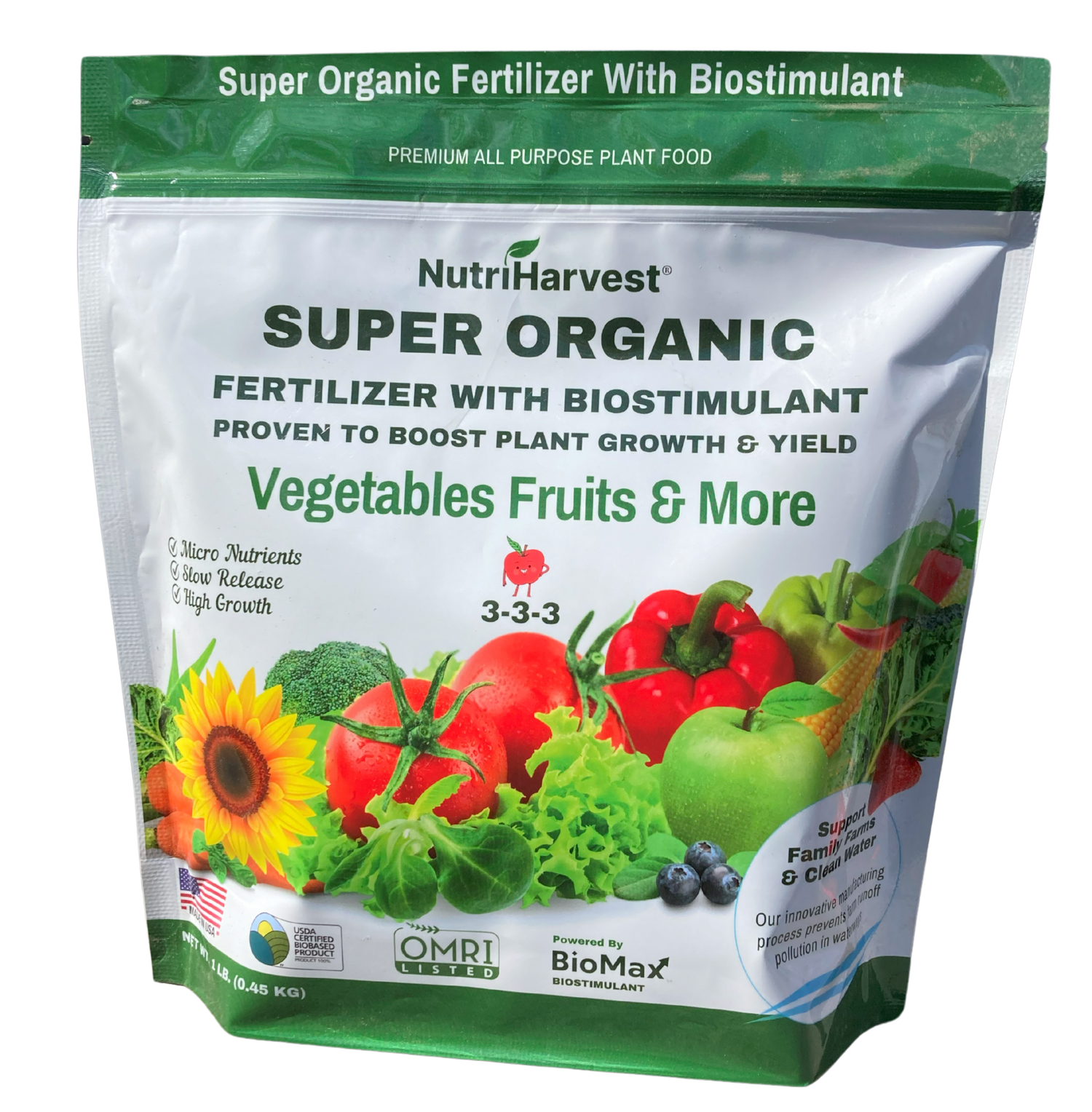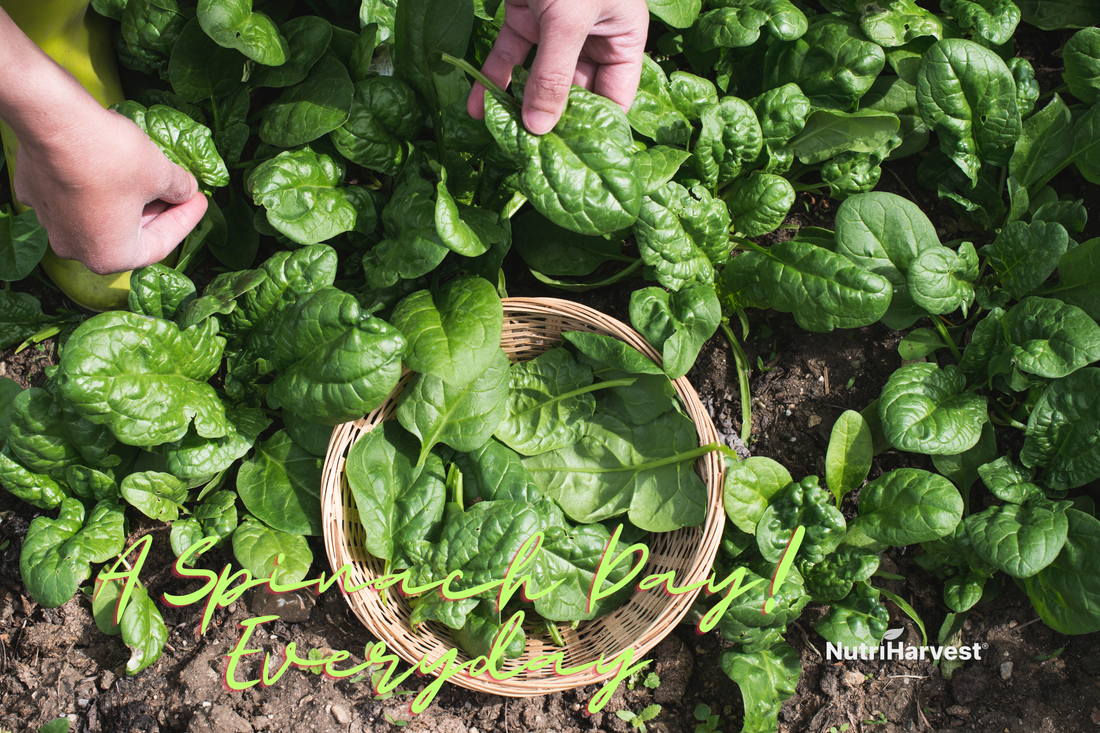Are you ready to unleash the superpowers of your garden? Spinach, the leafy green champion fed with the nutrient-rich organic fertilizers are here to save the day! Get ready for a thrilling journey into the world of gardening, where healthy soil and vibrant greens reign supreme. Make everyday a Spinach day!
Why Spinach? Everyday A Spinach Day!

But wait, there's more! Spinach is also incredibly versatile. Whether you toss it in salads, blend it into smoothies, or sauté it as a side dish, spinach adds a delicious and nutritious punch to any meal.
The Magic of Organic Fertilizers
Now, let's talk about the secret behind thriving spinach - organic fertilizers! Unlike their synthetic counterparts, organic fertilizers are made from natural ingredients. Not only do they nourish your plants, but they also enrich the soil, promoting a healthy ecosystem in your garden.
Organic fertilizers work hand in hand with nature, providing a steady supply of nutrients to your spinach without the harmful chemicals found in conventional fertilizers. Plus, they help improve soil structure, retain moisture, and reduce the risk of nutrient runoff, making them a win-win for both your garden and the environment.
The Dynamic Duo: Spinach and Organic Fertilizers
Now, here comes the exciting part - combining spinach with organic fertilizers! Picture this: lush green leaves reaching for the sun, vibrant and full of life. That's the power of pairing spinach with organic fertilizers.
By feeding your spinach with organic fertilizers, you're giving it the fuel it needs to thrive. You'll notice stronger, healthier plants with bigger yields and better flavor. Plus, since organic fertilizers release nutrients slowly over time, you'll enjoy a steady supply of spinach throughout the growing season.
But the benefits don't stop there! Organic fertilizer also improve soil health, creating a fertile environment where spinach and other crops can flourish year after year. Say goodbye to depleted soils and hello to bountiful harvests!
Tips for Success
Ready to get started? Here are a few tips to help you make the most of your spinach and organic fertilizers:
- Start with quality soil: Good soil is the foundation of a successful garden. Invest in organic potting mix or amend your existing soil with compost to provide a nutrient-rich environment for your spinach.
- Choose the right fertilizer: Look for organic fertilizers specifically formulated for leafy greens like spinach. Follow the instructions on the packaging for best results.
- Feed regularly: Spinach is a hungry plant, so be sure to fertilize it regularly throughout the growing season. Aim for once every 4-6 weeks to keep your plants happy and healthy.
- Mulch, mulch, mulch: Mulching helps conserve moisture, suppress weeds, and regulate soil temperature. Use organic materials like straw, grass clippings, or shredded leaves to mulch around your spinach plants.
- Harvest often: Keep your spinach plants productive by harvesting leaves regularly. This not only encourages new growth but also prevents the plants from bolting (going to seed) prematurely.
Pick a good Variety of Spinach: Explore the Green Universe
Embark on a journey through the vast and varied world of spinach varieties! From tender baby leaves to hearty savoyed greens, there's a spinach for every palate and garden. Let's dive into the exciting realm of spinach diversity and discover which varieties might be perfect for your garden.
Savoy Spinach
If you're a fan of texture and flavor, savoy spinach is sure to delight your taste buds. Characterized by its crinkled leaves and robust flavor, savoy spinach is a popular choice for salads, soups, and sautés. This variety is known for its cold tolerance, making it an excellent option for early spring and late fall plantings.Flat-Leaf Spinach
For those who prefer a smoother texture, flat-leaf spinach is the way to go. With broad, tender leaves and a mild flavor, flat-leaf spinach is incredibly versatile in the kitchen. Use it fresh in salads, wilt it into pasta dishes, or add it to your morning smoothies for a nutritious boost.Baby Spinach
Looking for a quick and easy addition to your garden? Baby spinach might be just what you need. Harvested when the leaves are young and tender, baby spinach is perfect for salads, sandwiches, and wraps. Plus, it's quick to mature, making it ideal for gardeners with limited space or time.Bloomsdale Spinach
For a classic spinach flavor with a twist, try growing Bloomsdale spinach. This heirloom variety features glossy, dark green leaves with a savoyed texture and rich flavor. Bloomsdale spinach is known for its heat tolerance, making it a great choice for summer plantings in cooler climates.Tyee Spinach
If you're looking for a reliable and productive spinach variety, look no further than Tyee spinach. This hybrid variety boasts large, dark green leaves with a smooth texture and mild flavor. Tyee spinach is resistant to bolting and disease, making it a favorite among home gardeners and commercial growers alike.Related Data:
- Days to Maturity: The time it takes for spinach plants to reach harvestable size varies depending on the variety. Baby spinach typically matures in 25-35 days, while savoy and flat-leaf varieties may take 40-50 days.
- Spacing: When planting spinach, space seeds or seedlings approximately 6-8 inches apart in rows that are 12-18 inches apart. This allows the plants room to grow and ensures good air circulation, which can help prevent disease.
- Yield: On average, a single spinach plant can produce anywhere from 4-6 ounces of leaves per harvest. With regular harvesting and proper care, you can expect to enjoy multiple harvests throughout the growing season.
Nutrients for Thriving Spinach: Unveiling the Secrets of NPK and More
To unlock the full potential of your spinach garden, it's essential to understand the nutrients that fuel its growth. Let's delve into the vital elements, both macro and micro, that spinach craves for optimum health and the role they play in organic fertilizers.
Macro Nutrients: NPK
- Nitrogen (N): Nitrogen is crucial for leafy green vegetables like spinach as it promotes vigorous leaf growth and vibrant green color. A deficiency in nitrogen can result in stunted growth and pale, yellowish leaves. Look for organic fertilizers with a balanced nitrogen content to ensure your spinach plants receive an adequate supply.
- Phosphorus (P): Phosphorus plays a key role in root development and overall plant growth. It aids in the transfer of energy within the plant and supports healthy flowering and fruiting. While spinach doesn't require as much phosphorus as some other crops, a small amount is still necessary for optimal growth. Natural and organic phosphates are excellent organic sources of phosphorus to include in your fertilizer regimen.
- Potassium (K): Potassium is essential for maintaining plant health and resilience to stress. It helps regulate water uptake, improves disease resistance, and enhances fruit quality. While spinach isn't particularly potassium-hungry, incorporating potassium-rich organic fertilizers can still benefit overall plant vigor and yield.
Micro Nutrients: The Hidden Gems
In addition to the primary NPK trio, spinach relies on a range of micro nutrients for proper growth and development. These micronutrients, although required in smaller quantities, are equally vital for maintaining plant health and productivity. Some key micro nutrients essential for spinach include:
- Calcium (Ca): Calcium is essential for cell wall formation, helping to maintain the structural integrity of plant tissues. A deficiency in calcium can lead to disorders like blossom end rot in fruits and vegetables. Incorporating gypsum or crushed eggshells into your soil can provide a supplemental source of calcium for your spinach plants.
- Magnesium (Mg): Magnesium is a central component of chlorophyll, the pigment responsible for photosynthesis. It plays a crucial role in energy production and enzyme activation within the plant. Epsom salt, a magnesium sulfate compound, is a readily available and effective organic source of magnesium for spinach.
- Iron (Fe), Zinc (Zn), and Manganese (Mn): These micronutrients are involved in various metabolic processes within the plant, including enzyme activation and electron transport. Deficiencies in these nutrients can result in reduced growth, chlorosis (yellowing of leaves), and susceptibility to disease. Organic fertilizers containing trace minerals or amendments like composted manure can help ensure a balanced supply of these micronutrients for your spinach.
Choosing the Right Fertilizer
When selecting organic fertilizers for your spinach, opt for products that provide a balanced blend of macro and micro nutrients to meet the specific needs of leafy greens, and look for labels indicating the NPK ratio, as well as the presence of additional micronutrients such as NutriHarvest® Organic Fertilizers. By nourishing your spinach plants with a well-rounded organic fertilizer, you'll promote healthy growth, robust yields, and deliciously nutritious harvests!
Spinach in Numbers: A Snapshot of Green Goodness
Let's take a closer look at some fascinating statistics that highlight the importance and popularity of spinach:
- Nutritional Powerhouse: Spinach is renowned for its nutritional benefits, and the numbers back it up. Packed with vitamins A, C, and K, as well as iron, calcium, and folate, spinach is truly a superfood. Just one cup of raw spinach provides over 50% of your daily vitamin A and K needs!
- Global Production: Spinach is grown and enjoyed around the world, with significant production in countries like China, the United States, Japan, and India. As per IndexBox forecasts, based on the Food and Agriculture Organization (FAO), global spinach production increased by 5.4% to reach 32 million tons in 2020, demonstrating its widespread popularity and importance in global agriculture.
- Consumption Trends: Spinach consumption has been on the rise in recent years, driven by increasing awareness of its health benefits and versatility in cooking. In the United States alone, per capita spinach consumption has nearly doubled since the 1980s, with Americans now enjoying an average of over 2 pounds of spinach per year. As per IndexBox forecasts, the world will consume 42M tons of spinach by 2030.
- Economic Impact: Spinach farming contributes significantly to the agricultural economy, providing livelihoods for farmers and supporting local communities. In regions where spinach is a major crop, such as California's Salinas Valley, the spinach industry plays a vital role in employment and economic growth.
- Organic Spinach: With growing concerns about pesticide residues and environmental sustainability, organic spinach has become increasingly popular among consumers. According to the Organic Trade Association, sales of organic spinach in the United States surpassed $250 million in 2020, reflecting a growing demand for organic produce.
- Health Benefits: Beyond its nutritional content, spinach has been linked to numerous health benefits, including improved heart health, reduced risk of chronic diseases, and enhanced digestive function. Studies have also shown that the antioxidants found in spinach may help protect against oxidative stress and inflammation.
From its nutritional prowess to its global popularity, spinach stands out as a true powerhouse in the world of food and agriculture. Not only have you grown these, but you've also nurtured them in an organic environment that's healthy for the planet. As consumption continues to rise and interest in organic and sustainable farming practices grows, spinach is poised to remain a beloved staple on dinner plates around the world. So next time you enjoy a crisp, refreshing spinach salad or a hearty spinach lasagna, remember the impressive numbers behind this humble green leafy vegetable!
Final Thoughts
So there you have it - the dynamic duo of spinach and organic fertilizers! With their powers combined, you'll be well on your way to a thriving garden full of nutritious greens and happy plants. Using organic fertilizers is a step toward enhancing soil health. These natural products enrich the soil with beneficial nutrients, improving plant resilience and growth. It works for all type of plant growers whether you want to enjoy your beautiful backyard garden or cultivating a sustainable greenhouse business growing plants or have a thriving farm tending corn and other crops. So go ahead, channel your inner Popeye, and start growing your own superfood today!



